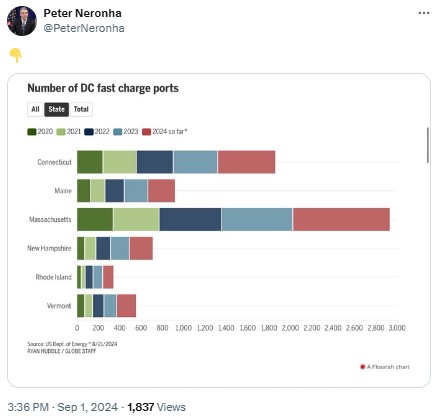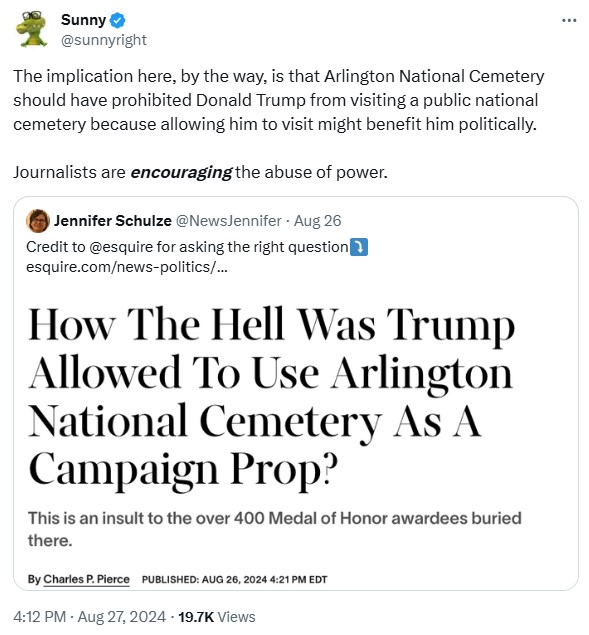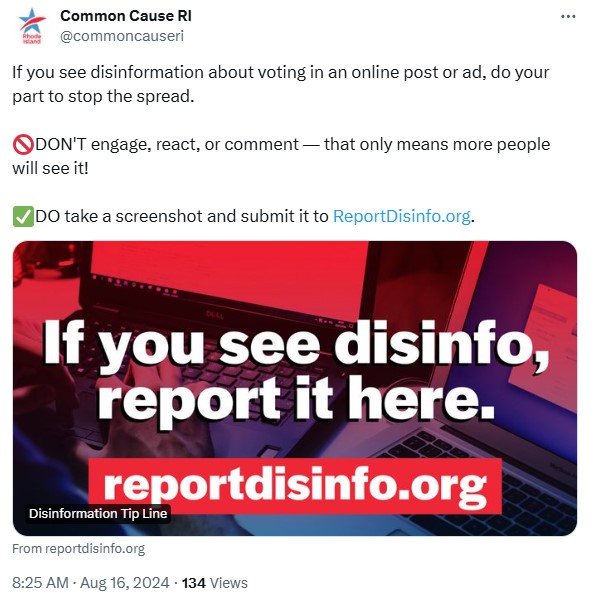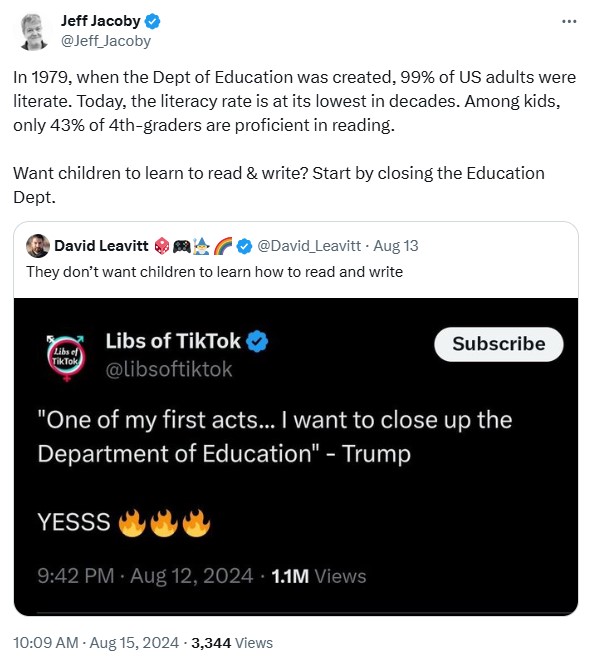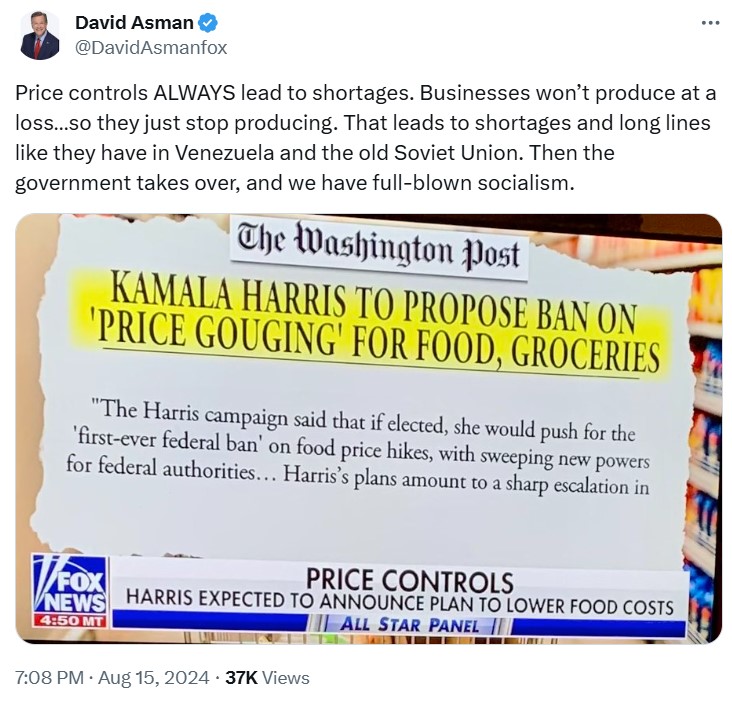Following the determination in April that the Washington Bridge eastbound was becoming “considerably more sensitive” (gulp), RIDOT contracted to install a new, combined structural health monitoring and vehicle weigh-in-motion program on/between the Washington Bridge and the Iway (Providence River Bridge). In May, RIDOT entered into a five year “sole source” – i.e., no RFP –…
Democrats’ acceptance of violence from their own partisans, especially labor unions, is a major warning sign that they’ll turn away when it happens again in the future, but it’s especially disconcerting to see Attorney General Peter Neronha celebrating violence against police officers: If I seem to be exaggerating, it’s only because I’m not accepting as…
As I understand it, RealPage offers landlords software for renting out and managing their properties. Like other such software across industries, it uses automation and analytics to help its clients conceptualize their assets and their businesses and squeeze out inefficiencies. Among those services is an algorithm that uses local real estate data, including from its…
Not long ago, the ladies of The View displayed the number of associates of Donald Trump who have recently* gone to prison as evidence that “the system is working.” We’d be in better condition as a country if more people realized that the very same visual leads to opposite conclusions for different people, creating a dangerous…
Gene Valicenti’s weekly Tuesday conversation on WPRO with Brown University Professor Wendy Schiller took a slightly unexpected turn yesterday when Gene honored her request to comment on the handling of the Washington Bridge closure. (Starts at Minute 06:45.) Schiller: This is a significant, major problem that if something goes wrong with the eastbound side, for…
They may not be straightforward or easily articulated, though, so just read them through and absorb the awfulness. Here’s the background: Built in the 1980s and 1990s where Scituate Avenue meets Furnace Hill Brook, Alpine Estates was one of the first of what would become many modern subdivisions on what used to be western Cranston…
Although it feels as if genuine policy debates have receded into the background in Rhode Island, reviving them may help correct the corrosion spreading throughout our civic house. Corporate tax incentives, for example, are an area in which conservatives and progressives in Rhode Island tend to agree on the binary “yes/no” question, raising the possibility…
The past week has brought us a startling display of dishonesty from the Democrat Party. Politicians with multiple mansions talked about not letting people take more than they need. The Party’s stated policies, not to mention its level of respect for people who are not its supporters, are nearly inverted from what they’ve actually done…
I suggest the title of this post acknowledging I don’t know a whole lot about Johnston’s unique political scene. Locally, things can be very specific to the individuals involved and their disputes, but I have been a keen observer of factors that make it more difficult for Republicans to work through those disputes. Apparently, Johnston…
[The Roll Call speech, below, by RI GOP National Committeewoman Sue Cienki on July 15 at the RNC Convention included a description of offshore wind, “industrial vandalism of the ocean”, that was not only on point but prophetic — the very next day, Nantucket announced the closure of its beaches and the world began to…
I’ve been railing for years against the public policy inclination coming down from the state Department of Education to have schools actively lie to parents about their children’s expressed gender identity. Social media can sometimes give the impression that the tide is turning, and it may be, but we should expect progressive strongholds in Rhode…
A theme one picks up from podcast discussions with cognitive scientists is that much of our perception — what we understand as real — is a matter of our choices about what we don’t pay attention to. A fully capable human has five senses, all of which are constantly sending more data to the nervous…
The New York “justice” system may or may not jail Donald Trump, but the impression Democrat partisans are giving is that the entire charade of a trial was meant primarily to produce the label, “convicted felon.” This marketing ploy, as Roger Kimball notes, may not be working: “It’s my sense that the effort to weaponize…
We’re getting strong reminders, lately, that a free society with mutual respect for rights is vulnerable to those who have no such respect and don’t much like freedom. Among the most-stark examples I’ve seen is this incident, in which pro-Hamas Columbia activists encircle and bodily remove a student who objected to their destroying a campus…

I realized this when watching Democrats’ repeated proclamations about jobs numbers during the Obama years only to see those numbers quietly revised the following month, almost always with the revision making touted jobs disappear, rather than quiet corrections representing improvements. Now, it seems crime data has the same partisan infection. All year, we’ve been hearing that violent crime is down under President Joe Biden, but a few weeks ago, the FBI quietly revised its numbers to show a 4.5% increase in 2022, rather than a decrease. Naturally, that makes the 2023 decrease seem even larger, but here’s the key point:
“I have checked the data on total violent crime from 2004 to 2022,” Carl Moody, a professor at the College of William & Mary who specializes in studying crime, told RealClearInvestigations. “There were no revisions from 2004 to 2015, and from 2016 to 2020, there were small changes of less than one percentage point. The huge changes in 2021 and 2022, especially without an explanation, make it difficult to trust the FBI data.”
These numbers are non-transparent estimates, and no explanation for revision is being offered. The most rational conclusion is that bureaucrats are doing their part to “save our democracy” by keeping Democrats in power.
The news cycle flows by so quickly, lately, that political actors and activists are learning it’s sometimes best to just keep your head down and let the controversy of the day join the rest of the noise tomorrow. Nonetheless, I think there’s something worth noting in the now-passed story about Russia funding some conservative commentators.
First, my caveat is that I no longer trust America’s intelligence services or news media. Even where stories aren’t entirely fabricated, there are simply so many ways to construct a narrative. The agent or journalist can exaggerate claims or leak one-sided information that distorts the context of what’s happening. Imagine, and I’m not saying this is happening, that every commentator across the political spectrum receives some portion of his or her revenue from hostile foreign governments — that it’s simply part of the ecosystem. Releasing that information only as it relates to one group of commentators would make it seem as if they are uniquely bad.
Caveat aside, I can sympathize with some of the commentators’ defenses. I’ve always said what I have to say, and if somebody’s wants to give me money to say it, that’s great. That person didn’t change my view or buy my opinion.
What he or she would be doing, though, is making it possible for me to continue saying what I have to say… and to say more of it. By selectively funding points of view, financiers can adjust the broad field of commentary. It’s not the writer’s fault for wanting to be heard, and frankly, it’s not even the financiers’ fault for wanting to advance their visions. We all have to have our own moral compasses and approach information intelligently and with caution.
To be sure, this is a social challenge, but it doesn’t lend itself to easy solutions. Attempting to force transparency or, worse, ban pernicious funding or statements only amplifies the caveat expressed above.
I find it ominous that one of my children’s dentist just cancelled an appointment for tomorrow due to short staffing. RI’s medical infrastructure feels a bit like we could get the equivalent of an emergency Washington Bridge closure at any time. Or maybe we’ve been getting them, but the people who run the state are better able to distract from and hide the effects.
Last night, I read a business case about a handful of billionaires who’ve been trying to make lab-grown meat a viable consumer product, and I wondered something tangential. Imagine if a handful of billionaires decided they needed to have a pliable big-government progressive in the White House.
They might flood her accounts with hundreds of millions of dollars laundered through untraceable donations designed to appear grass roots.
They might use the major media outlets they own to twist reality.
They might pay people to fill up arenas so that the candidate appears to be popular.
Then they might manipulate an insecure election system, including mail ballots, to simply install their preferred candidate, while pointing at the scandals they generated in media about the other candidate and the astroturf popularity of the “winner.”
This might sound conspiratorial and crazy, but these same people are trying to grow frankenburgers — not because they think it will be profitable, but because they want to “save the environment” and trick you into a diet that they believe is healthier.
It’s a passing thought, of course, but Rhode Island Governor Dan McKee’s mild lament that a State House celebration of a basketball trophy is happening during school hours bugs me. Somehow, it emphasizes the point that our government officials see the well-being of children — of all regular Rhode Islanders, for that matter — as secondary side-effects of insiders’ going about their big, important business, which seems often to focus on providing them power and enjoyment.
A local kid making it big is an inspiring story, but local officials use such things to inspire mainly themselves.
Something more like a cookbook or plantation. I’ve heard complaints that conservatives have “no plan for you” — or “no vision for what the town should be” — repeatedly over the years, and I think it’s the most disturbing complaint progressives make.
Chris Rufo articulates my view:
Where do I see the town, state, or country going? Well, I hope it’s going toward freedom and mutual good will, but that’s about as detailed as I can get. Mostly, I’m excited to see where individual people, families, and organizations will take us with their drive and ingenuity, but terrified of where activists who abuse government power to implement their plans and vision will take us if we let them.
The reason it’s terrifying isn’t only that unrealized gains are purely hypothetical. The proposal (and defenses of it) show that for many taxation has become purely a money-finding scheme requiring the scantiest of rationale. By their nature, unrealized capital gains do not actually exist; they are hypothetical.
While striving to come up with some sort of argument that they’d be nothing radical, I’ve seen supporters make two arguments: First, that people pay taxes on the increased value of their homes through the property tax, and second, that people with large assets are able to use them as collateral for loans, which means they are real.
On the first count, the property tax isn’t a tax on gains. It’s an ad valorem tax — that is, on the whole value — assessed and paid repeatedly every year. Moreover, in most cases, it’s actually a tax on the percentage the individual or entity owns of all the taxable property within that particular government’s scope. Typically, the government figures out how much tax it wants to collect, and the value of a piece of property is the proportion the taxpayer will pay. Some years it will go up, relative to other taxpayers, and some years it will go down.
The same thing partially applies to the other count. Lenders are considering the entirety of assets as collateral, not just new gains. More importantly, what they’re doing is assessing that the entire asset is sufficiently secure that it could be sold to cover an unpaid debt, and the lender accepts the risk. That the lender trusts that the value will be real at some hypothetical future date following a default does not mean that it is real right now.
With the caveat that we have to infer what he’s trying to suggest, I think we can conclude Attorney General Peter Neronha is implying Rhode Island isn’t keeping up on electric vehicle charging ports:
Well, yeah. Rhode Island is a small state, geographically, meaning people are never very far from home, and in any event, from what I’ve seen around the state, we’ve already got more charging ports than the population is demanding.
That’s the thing about government-originated “investments.” In the private sector, somebody would see the need for something, as indicated in this case by lines for charging ports or something like that, and invest in a profitable solution. In government, activists decree a standard, and politicians lament that they haven’t met the activists’ expensive standards.
But we have to be wary of the political whipsaw. Evan Masse’s tweet was dumb and insensitive, but his practical problem was that he was caught up in what we might call a Democrat call for evidence.
It would be a very normal reaction to pause upon seeing Walz’s son at the Democrat National Convention and observe his filmed reaction was a bit outside of the range for normal behavior, but as the inverted media cliche goes, the Democrats pounced. TwiX was full of lamentations about attacks on the boy, as if there were Republicans holding mockery parties, as opposed to a few marginal comments. Democrats were quickly fundraising off their righteousness.
So of course the news media is going to get the message that they should be out there trying to find related stories, and of course local Democrats are going to be eager for the ammunition. Republicans have to expect that and act accordingly, not only for their own behavior, but also for those with whom they interacdt.
In Rhode Island, the GOP is very accepting and eager for support and help, but members of the party have to be vigilant and to coach those in their midst.
Katherine Gregg took a look at the current state of the race for leadership of the Rhode Island GOP, and the question that comes to my mind is whether it really matters. On a surface level, the uncertain proposition is that even a functioning GOP could make a difference, which I’m not sure the Rhode Island system would allow anymore.
More deeply, to the extent the RIGOP could make a difference, I’m not sure any of the candidates or commentators — in or out of Gregg’s piece — say anything that indicates they understand the problem. There’s a lot about messaging. Some maligning of Donald Trump as the heart of the problem, and (most usefully) encouragement of the basics of electoral mechanics, such as recruiting and training candidates.
But none of that is adequate. Even great candidates with the right message will be rolled by aggression and deliberately fostered chaos. Those who oppose the establishment in Rhode Island need coherence and the mutual support it fosters. What we need is social, advancing cultural change. The RIGOP can help or hurt in that project, but the real fix isn’t, strictly speaking, political.
We should repeal all federal income taxes. Income taxes are a great evil that has changed the nature of our relationship with government.
Instead, the federal government should be funded through a capitation (per-person) tax payable proportionally by each state. That is, our states would be responsible for collecting a tax calculated based purely on their own population counts, and each could collect the money in the way it deems best.
While their geographies, populations, and resources might make different forms of taxation preferable across the states, my generic preference is for a property tax collected at the municipal level and then paid upward to the state as the means of state funding.
The value of the government is the value of being within its borders, and its revenue should be directly related to that value, with as few subjective or confounding factors as possible. Why should we be taxed on income or production (sales)?
Observing the lack of media curiosity about who runs the country while Joe Biden takes weeks of vacations, Steyn asks:
If that question is of no interest to the media or the majority of the American people, then what is the point of being breathless with excitement over a two-year presidential election campaign? Or even the truncated three-month express-check-in Kamala Harris version?
Arguably, Donald Trump became president because enough Americans were fed up with elections’ meaninglessness, and the Democrat establishment has responded by making them even more so. None of it — the health of the nation, the policies, the candidates — seems to matter anymore, provided the Party stays in power.
Steyn goes on to observe that France’s ruling party is refusing to step aside despite losing, and English progressives’ governing like they’ve got a mandate when their victory was narrow. As he writes, “when the left win, they’re in power; when the right win, they’re in office.” In England’s case, that means the elimination of the right to speak against government immigration policies.
Again, that “doesn’t leave a lot of point to the democratic process, does it?” No, and time is getting short to put a stop to this deterioration.
Note how progressive Democrats have framed the universe, as Sunny observes:
As always, people who disagree with progressives are abusing power when they do anything to their own advantage, but progressives are never abusing power when they do whatever it takes to win. Keep an eye out for this dynamic especially when it comes to cheating in elections. Whatever they can’t claim is unproven, they excuse as simply doing what is necessary to win.
Progressives won’t admit it, often even to themselves, but the only thing that is truly against the rules is defeating progressives.
Gabrielle Caracciolo, of NBC 10, reports that the McKee administration is hiding behind its lawsuits to avoid releasing the “forensic analysis… to determinhe what went wrong and who is responsible for the failure of the Washington Bridge.” But she did do some investigating:
An NBC 10 News investigation found when it comes to “quality control and assurance,” the state’s bridge inspection manual indicates both the consultant and the state bear some responsibility.
According to the manual, consultants responsible for inspections are required to ensure the reports are reviewed for “completeness, accuracy and content.”
It is (or should be) obvious that the government entity accountable to the public for public works projects is ultimately responsible for failure. Journalists shouldn’t have to investigate that proposition, and the governor shouldn’t pretend it isn’t so for the sake of lawsuits.
We’re entering a truly bizarre form of representative democracy in Rhode Island. Just as the government regulates speech in the one area in which it should be least involved — politics and elections — it is claiming to be the one entity not accountable to the public. In essence, the governor’s position is that Rhode Islanders don’t need facts to ensure accountability of state department because the governor represents us, and he knows them, so we can hold him accountable for facts that we don’t know… or something.
… to relieve their existential anxiety, people want a simple story in which the good guys and the bad guys are easy to identify.
Genuinely bad people are willing to lie and tell that simplistic story, while good people acknowledge nuance and accept a share of blame. This imbalance tilts the community’s judgment scale against the good people and worsens as individuals who are less bad become more invested in the story and individuals who are less good become less willing to stand with the nuance because they are then saddled with disproportionate blame.
A moment will come (and we’re fast approaching it) when the lies of the bad have become so outrageous and harmful to everybody that their badness is, indeed, obvious and nuance does not apply because their blame is wholly owned. Yes, that moment will come, but its arrival does not inevitably portend the victory of the good; it may come too late.
Mark Steyn raises the peculiarity of the mysterious deaths of two businessmen who actually managed to beat the U.S. Department of Justice’s process-is-the-punishment racket. Apparently, the statistics suggest that the DOJ way overcharges its targets in the hopes of pushing for a settlement: “95 percent of cases are won by prosecutors, 90 percent of those without trial.”
Despite the odds, Mike Lynch and Stephen Chamberlain won their case, but now both are dead under mysterious circumstances. Lynch’s yacht fell victim to a fluke boating calamity, and Chamberlain was hit by a car while on his daily run.
The latter is what brings to mind a bit of forgotten Rhode Island mafia history. Shortly after his paper published information about a secret mafia ceremony, publisher Michael Metcalf died by falling off his bicycle. Sure, authorities concluded it was simply an accident, but Projo chairman and publisher, at the time, Stephen Hamblett expressed some skepticism: “we cannot forget that Mr. Metcalf was publisher of newspapers known for their investigative stories and editorials on crime. This fact, coupled with the unique circumstances surrounding his death, make it impossible for us to rule out foul play.”
I’ve often noted that the popular Crimetown podcast had a notable shift in its first season, starting with mafia corruption and moving into government corruption. It has seemed to me that perhaps that captures a trend that actually happened in the Ocean State. If the United States government is following the same trend, we should all be worried, indeed.
In the heat of the battle, political controversies over yard signs can become an almost comedic proxy for heated disagreements. I’ve seen people in the heat of a busy campaign drop everything to do battle with people stealing the yard signs of the other side or placing their own signs on property where they aren’t allowed.
A consistent lesson is that people will cheat when they perceive the stakes to be high, when they’re caught up in the result, and when they think it unlikely they’ll be caught. So, it’s disconcerting to see mail ballots joining yard signs in the heat of the Democrat primary for Rhode Island House District 9.
In addition to the normal yard sign controversies, State Representative Enrique Sanchez is raising a red flag about voters’ phone numbers being switched for mail ballots. More dramatically, one of his opponents, Santos Javier, has filed complaints, accompanied by notarized letters from people alleging that a Sanchez supporter has been pressuring voters to sign ballots before taking the ballots and filling in the vote for Sanchez.
That sounds like a pretty drastic and risky approach to mail ballot fraud, leaving campaigns apt to be caught, but we should take it as a warning. The placement of a particular yard sign is of unknowable value in a campaign, but these are actual votes.
… by the discomfiting fascist, Orwellian tone of this campaign from supposed good-government-group Common Cause RI:
It’s bad enough on its face, but it’s worse when you break down the manipulative message. First, Common Cause wants you to believe that you can instantly identify “disinformation about voting.” Next, the organization asserts that you have a responsibility to act against it. The first step in doing so is to help censor it by failing to “engage, react, or comment.” Instead, you’re to run to the nearest authority — Common Cause — in order to file a report.
And who are these authorities? That’s the curious part. Common Cause RI has been a leading force in our state creating regulatory barriers to civic engagement, with the excuse of providing voters with information about who’s supporting candidates and causes. Yet, the ReportDisinfo About page is laughably sparse. There’s a box on the bottom that looks like a button, saying “Paid for by Common Cause Education Fund,” but it’s not a button. You’d have to investigate even that.
There’s little doubt in my mind that Common Cause RI will be onboard someday when progressives start rounding people up for wrongthink.
Boston Globe columnist Jeff Jacoby offers a startling statistic:
Blaming the Department of Education isn’t only a matter of post hoc ergo propter hoc, and I’d say the unionization of teachers played an equal or greater role in destroying American education. To be sure, both developments echo a similar underlying problem in the same direction: They move education farther from families’ ability to force accountability for failure on the system. The Department of Education facilitates top-down policy from far-away D.C., in part by empowering academic experimenters, while teachers’ unions transform the workforce on the scene into an unaccountable jobs program.
But again: People don’t have to agree with my conclusions for us to agree that we ought to be debating this problem more.
I mean the title of this post in the sense both that progressivism/socialism ignores human nature and that it pretends people aren’t human. Consider:
The underlying assumption appears to be that producers will simply produce because they are producers. Human beings don’t fall into nice progressive categories. We make decisions and change our status, and it can be in directions that produce better outcomes for everybody or that don’t.
I may revise my opinion if conflicting results come in, but for now, I’m choosing to believe that this is 100% on the money:
Among 6,001 Health and Retirement Study participants in the U.S., drinking two or more cups of coffee a day was associated with a 28% lower risk of dementia over 7 years compared with drinking less than one daily cup (P<0.05), reported Changzheng Yuan, ScD, of the Harvard T.H. Chan School of Public Health in Boston and the Zhejiang University School of Medicine in China, in a poster presented at the meeting. …
When total caffeine intake derived from coffee and tea was calculated, participants in the highest quartile of caffeine consumption had a 38% decreased risk of dementia (P=0.032), Yuan and co-authors said.
At the very least, people should have learned by now to be cautious about accepting or rejecting proclamations about what is or isn’t good for us, with especial wariness when the instruction is to stop doing something you like.
Generally, I’ve found that “believers in science” don’t seem to appreciate the complex ways in which our bodies were conditioned through evolution to interact in complex, overall beneficial, ways with substances we enjoy.
Politics This Week: Nothing a Little Genuine Competition Couldn’t Fix
John DePetro and Justin Katz follow local stories’ thread of RI’s obvious need for political competition.
Politics This Week: Corruption Without Competition
John DePetro and Justin Katz discuss ways in which corruption thrives without competitive elections.
Politics This Week: When “Public Service” Is the Day Job
John DePetro and Justin Katz wonder where the will for public service has gone.
Politics This Week: Leadership Asleep at the Wheel
John DePetro and Justin Katz review some of the ways in which Rhode Island’s priorities are out of whack.
Politics This Week: Why Should They Stay?
John DePetro and Justin Katz check in on politics in RI.
Politics This Week: Does Anything Really Matter in RI Politics?
John DePetro and Justin Katz discuss the relevance of local, state, and national political news.
Politics This Week: By Their Accountability Will You Know Them
John DePetro and Justin Katz expose the underlying connections in RI politics.
Politics This Week: In Search of Themes
John DePetro and Justin Katz decipher the themes of state and national politics.
Politics This Week: Progressive Parent Figures
John DePetro and Justin Katz review the political talk of the week in Rhode Island and nationally.
Politics This Week: Who RI Works For
John DePetro and Justin Katz talk about who benefits (and who doesn’t) from recent items in the news.
Rhode Island’s Tiny Greenhouse Gas Emissions: the Obvious and the Not-So-Obvious
The above pie chart speaks for itself. Rhode Island’s greenhouse gas emissions are so small, they barely register on the chart. That Rhode Island, the smallest state in the country…

I realized this when watching Democrats’ repeated proclamations about jobs numbers during the Obama years only to see those numbers quietly revised the following month, almost always with the revision making touted jobs disappear, rather than quiet corrections representing improvements. Now, it seems crime data has the same partisan infection. All year, we’ve been hearing that violent crime is down under President Joe Biden, but a few weeks ago, the FBI quietly revised its numbers to show a 4.5% increase in 2022, rather than a decrease. Naturally, that makes the 2023 decrease seem even larger, but here’s the key point:
“I have checked the data on total violent crime from 2004 to 2022,” Carl Moody, a professor at the College of William & Mary who specializes in studying crime, told RealClearInvestigations. “There were no revisions from 2004 to 2015, and from 2016 to 2020, there were small changes of less than one percentage point. The huge changes in 2021 and 2022, especially without an explanation, make it difficult to trust the FBI data.”
These numbers are non-transparent estimates, and no explanation for revision is being offered. The most rational conclusion is that bureaucrats are doing their part to “save our democracy” by keeping Democrats in power.
The news cycle flows by so quickly, lately, that political actors and activists are learning it’s sometimes best to just keep your head down and let the controversy of the day join the rest of the noise tomorrow. Nonetheless, I think there’s something worth noting in the now-passed story about Russia funding some conservative commentators.
First, my caveat is that I no longer trust America’s intelligence services or news media. Even where stories aren’t entirely fabricated, there are simply so many ways to construct a narrative. The agent or journalist can exaggerate claims or leak one-sided information that distorts the context of what’s happening. Imagine, and I’m not saying this is happening, that every commentator across the political spectrum receives some portion of his or her revenue from hostile foreign governments — that it’s simply part of the ecosystem. Releasing that information only as it relates to one group of commentators would make it seem as if they are uniquely bad.
Caveat aside, I can sympathize with some of the commentators’ defenses. I’ve always said what I have to say, and if somebody’s wants to give me money to say it, that’s great. That person didn’t change my view or buy my opinion.
What he or she would be doing, though, is making it possible for me to continue saying what I have to say… and to say more of it. By selectively funding points of view, financiers can adjust the broad field of commentary. It’s not the writer’s fault for wanting to be heard, and frankly, it’s not even the financiers’ fault for wanting to advance their visions. We all have to have our own moral compasses and approach information intelligently and with caution.
To be sure, this is a social challenge, but it doesn’t lend itself to easy solutions. Attempting to force transparency or, worse, ban pernicious funding or statements only amplifies the caveat expressed above.
I find it ominous that one of my children’s dentist just cancelled an appointment for tomorrow due to short staffing. RI’s medical infrastructure feels a bit like we could get the equivalent of an emergency Washington Bridge closure at any time. Or maybe we’ve been getting them, but the people who run the state are better able to distract from and hide the effects.
Last night, I read a business case about a handful of billionaires who’ve been trying to make lab-grown meat a viable consumer product, and I wondered something tangential. Imagine if a handful of billionaires decided they needed to have a pliable big-government progressive in the White House.
They might flood her accounts with hundreds of millions of dollars laundered through untraceable donations designed to appear grass roots.
They might use the major media outlets they own to twist reality.
They might pay people to fill up arenas so that the candidate appears to be popular.
Then they might manipulate an insecure election system, including mail ballots, to simply install their preferred candidate, while pointing at the scandals they generated in media about the other candidate and the astroturf popularity of the “winner.”
This might sound conspiratorial and crazy, but these same people are trying to grow frankenburgers — not because they think it will be profitable, but because they want to “save the environment” and trick you into a diet that they believe is healthier.
It’s a passing thought, of course, but Rhode Island Governor Dan McKee’s mild lament that a State House celebration of a basketball trophy is happening during school hours bugs me. Somehow, it emphasizes the point that our government officials see the well-being of children — of all regular Rhode Islanders, for that matter — as secondary side-effects of insiders’ going about their big, important business, which seems often to focus on providing them power and enjoyment.
A local kid making it big is an inspiring story, but local officials use such things to inspire mainly themselves.
















